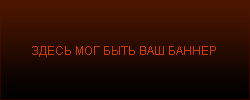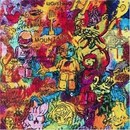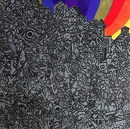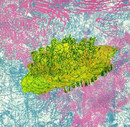Lightning Bolt is a noise rock duo from Providence, Rhode Island, composed of Brian Chippendale on drums and vocals and Brian Gibson on bass guitar. The band met and formed in 1994, when the members of the then-trio attended the Rhode Island School of Design. The band signed to Load Records in 1997, and released their self-titled debut the same year. In total, Lightning Bolt has released four full-length albums, numerous vinyl singles, and appeared on several compilations.









Lightning Bolt are known for their guerrilla-style live performances, where they typically play on the ground rather than a stage, with the crowd gathered around them. The band's sound is typically loud and aggressive, though the group cites composers Philip Glass and Sun Ra as compositional influences.
History
The band formed while Chippendale and Gibson attended the Rhode Island School of Design in Providence, Rhode Island, and Chippendale had heard about "a new kid" who was a whiz on the bass guitar.[1] The two formed Lightning Bolt, with Brian Chippendale on drums, Brian Gibson on bass guitar, and with Hisham Bharoocha on guitar and vocals joining the group after their first show.[1] Bharoocha left the group in 1996, with Chippendale taking over vocal duties. The only officially released music with Bharoocha was a track on the Repopulation Program compilation.[2] For the first few years, Lightning Bolt was primarily an improvisational band, touring the United States for months at a time and "just playing".[1] The concept of writing songs and recording an album didn't occur to the band until 1997, when Ben McOsker, founder of Load Records, approached the duo to record an album.
During these formative years, Chippendale and his freshman-year college roommate Matt Brinkman began to set up Fort Thunder, a disused warehouse space in the Olneyville district of Providence. The space eventually came to house a number of local avant-garde artists and musicians, including Brian Ralph and Arab on Radar as well as Lightning Bolt.[3]
In 2006, Lightning Bolt was deported from Japan days after they arrived to continue their tour from the UK. Band members were detained on arrival on the grounds that they did not have work permits. Their official appeal was rejected after 48 hours, and they were deported back to the United States.[4][5]
Recordings
Lightning Bolt have released a total of four full-length albums, a number of 7 inch singles and splits, and have appeared on numerous compilations. The band's first full-length album was a self-titled vinyl on the Load Records label. The record was initially released as a limited-edition vinyl of 750 pressings,[6] and a 50-minute companion cassette titled "Zone" also later released. In 1999 the album was re-released on CD, including "Zone" as bonus tracks and alternate cover art.[6][7] Lightning Bolt's second full-length album was Ride the Skies, released in 2001, followed by Wonderful Rainbow in 2003. In 2005, Lightning Bolt released Hypermagic Mountain, their most critically-acclaimed album to date.[8]
The band starred in the 2003 tour-DVD The Power of Salad. Lightning Bolt have also performed in DVD compilations such as Pick a Winner (2004) and Sleep When You are Dead by performance artists Mighty Robot (2007).
Rumors have persisted concerning the release of an improvisational album entitled Frenzy.[9][10][11] A post on Lightning Bolt's official website in early 2004 read "The next Lightning Bolt album, Frenzy, is currently in the works over at Load Records. It is expected to be available at the end of the summer."[12] No further word was given, and the next Lightning Bolt album released was in fact Hypermagic Mountain in 2005. In an early 2007 interview, Chippendale said "When it comes to weird improv stuff, sometimes we're just at a weird stalemate."[10] No official word has since been released.
Musical and lyrical style
The band's music takes cues from Japanese noise rock bands such as Boredoms and Ruins, although composers Philip Glass and Sun Ra are acknowledged influences.[1] The band's sound consists of Chippendale's frenetic drumming, his usually incomprehensible vocals, and Gibson's rhythmic bass guitar – an example of which is the song "13 Monsters", where Chippendale counts steadily to 13 through heavy distortion over the instrumentals of his drums and Gibson's bass guitar.
As the group's vocalist, Chippendale eschews a conventional microphone, instead using the type of microphone built into a household telephone receiver, held in his mouth or attached to a hood,[13] which is then run through an effects processor to further alter the sound. Chippendale has also used a KMD 8021 Drum Exciter, a simple drum-synth module, triggered by the bass drum.
Gibson plays his bass guitar tuned to cello standard tuning, in intervals of fifths (C G D A), using a banjo string for the high A. He used this four-string setup for several years, but has recently been seen using a five-string setup, tuned to C G D A E, with banjo strings for the A and E.[14] Gibson also uses several effects pedals, including overdrive pedals, an octaver, a delay pedal, and a whammy p